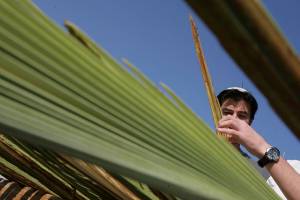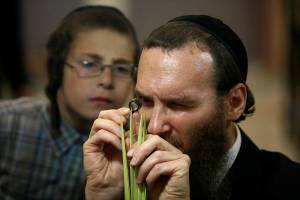

Rabbi Ari Enkin
The Lulav is the classic symbol throughout Jewish literature of the importance of balancing our priorities in life, which should include, first and foremost, caring for our fellow human being.
The story is told of the unfortunate Rabbi Mordechai of Chelm. He was so poor that he ate nothing more than bread and water at every meal. In honor of Shabbat he would purchase a small fish that he would eat at each of the three Shabbat meals.
There was one other item that he would “splurge” on: a beautiful Lulav bundle for the holiday of Sukkot. All year long he would put aside any spare change he had to save for his Lulav (palm branch) and Etrog (citron).
As was his routine each and every year, a few days before Sukkot he would make his way to the big city to purchase his Lulav bundle. Once, on his way to town, he encountered a man on the side of the road who was crying bitterly. Rabbi Mordechai went over to the man and asked him what was wrong and how he could help.

Checking out palm leaves at the market in Netanya. (Chen Leopold/Flash90)
The man explained that he was the water carrier for the local town. Every day he would take his horse and wagon out to the well, fill up his jugs, and bring them back to the city where he would sell the water. This job was his only source of income, and it provided him with barely enough money to support his family. Just that day, however, his horse suddenly collapsed and died. The man had absolutely no savings with which to purchase another horse. Yet without a horse, he had no way to make a living, and his family would starve.
Rabbi Mordechai took out all the money he had saved up for his Lulav and Etrog, and gave it to the man. It was exactly enough to buy a new horse. He then made his way home empty-handed.

A man examines a palm branch (lulav) for the Sukkot holiday in the community of Beitar Illit. (Nati Shohat/Flash90)
When Rabbi Mordechai arrived home, his wife asked how his trip went and what kind of Lulav bundle he managed to purchase. He told her that he was able to accomplish a tremendous mitzvah (Torah commandment) in honor of the upcoming Sukkot holiday, but it was not the mitzvah of the Lulav. He told her the whole story, saying he was more than happy to simply use the community Lulav and Etrog this year, fulfilling the mitzvah in a less-preferred manner, but fulfilling the mitzvah of making another person happy in an ideal way!
The Lulav is the classic symbol throughout Jewish literature of the need to be careful to balance our priorities in life. It is very common for people to spend huge sums of money on the very best Lulav and Etrog bundle – mere vegetation—but not to spend an equal sum on, or even show the same interest in, human beings!
There are two types of mitzvot: those between man and man, and those between man and God. We must be careful to treat the former type at least as carefully as we treat the latter.
By Rabbi Ari Enkin
Rabbinic Director, United with Israel

